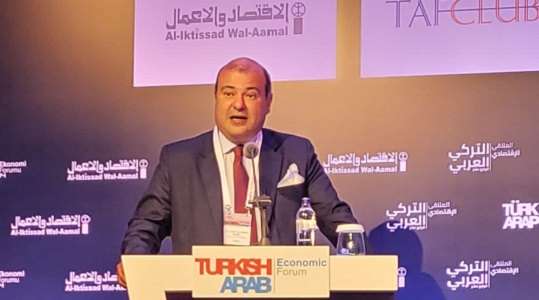The Secretary-General of the Union of Arab Chambers, Dr. Khaled Hanafi, stressed during his speech at the opening of the fourteenth Arab-Turkish Economic Forum, which was held in Turkey, in the presence of prominent Arab and Turkish ministerial figures, led by the Minister of Finance of the Arab Republic of Egypt, Mohamed Maait, and ministers from Qatar, Kuwait, and Turkey, the President of the Federation of Turkish Chambers and Exchanges, Rifat Hisarcioglu, and the President of the Federation of Egyptian Chambers of Commerce, Ahmed Al-Wakil, in addition to a prominent presence of Arab and Turkish businessmen, on the "The importance of the role played by the strong Turkish private sector, as well as the Arab private sector, which leads the production and investment process and employs the largest percentage of the labor force in the Arab region."
He stressed that "Arab-Turkish economic relations are continuous and always progressing, as data shows that Turkey is a major economic partner for the Arab region, as the volume of intra-Arab-Turkish trade reaches about 55 billion dollars. The volume of exports from the Turkish side is increasing annually by about 10 percent from the Arab region, in addition to the presence of direct and indirect Arab investments that have increased significantly and accumulated in recent years, especially in the housing and real estate sector, etc., in addition to the visits of more than 10 million Arab tourists visit Turkey annually.”
He said: “It is true that these numbers are good, but this is not what we aspire to, and in my capacity as Secretary-General of the Union of Arab Chambers, which was founded in 1951 and is considered the true representative of the Arab private sector in 22 Arab countries, its mission since its founding is to develop and strengthen economic relations between Arab countries by On the one hand, and between Arab and foreign countries on the other hand, I believe that no change or development in the form of Arab-Turkish economic relations can occur except through the private sector, as in fact the Turkish private sector, through the Chairman of the Turkish Chambers and Stock Exchanges, Mr. Rifat Hisarcioglu, is always keen to strengthen coordination and cooperation with the Union The Arab Chambers represent the Arab private sector in various occasions and circumstances.”
The Union’s Secretary-General, Khaled Hanafi, said, “The time today, especially after the Turkish elections that resulted in the re-election of His Excellency President Recep Tayyip Erdogan, and after the formation of a more open Turkish government, is considered favorable for the development of Arab-Turkish economic relations, so that they reach the desired and desired reality.”
He stressed that “governments open the doors towards developing relations, but what passes through is the private sector," pointing out that "there are free trade agreements between Turkey and Arab countries, and they are considered necessary to strengthen economic relations, but they are not sufficient, because today we need a change in the pattern of Relationship, we should not only seek to increase the volume of trade by 20-30 percent, or for the volume of trade exchange to reach the range of 70-80 billion dollars, but rather we seek and aspire to build a stronger and larger strategic partnership, we also seek to not only be markets that target each other but rather to be platforms and pivotal areas that benefit both the Arab and Turkish parties.”
He believed that “there is a great opportunity in light of the current global circumstances, which may be viewed as bad. Rather, in our view, it is an important opportunity that we must seize to strengthen regional cooperation. Today's supply chains are shorter than before, and on this level, we are considered the closest culturally and geographically to each other, and therefore we can change a lot in the pattern of our relationship, not just the size of our relationship. As Arab countries, we have keys in Africa, just as we have Arab keys in Asia, and thus through Turkey, we can access European markets. Which contributes to creating a new combination of strategic relationships and partnerships, which are the basis and not the simple trade exchange that exists at present.”
He noted, “We need more work, not only in goods trade, but also in a larger volume of services, and to exploit the opportunities of the Fourth Industrial Revolution and digitization. We can greatly employ our youth energies on both sides, as the Arab region is not economically homogeneous. There are significant economic differences, therefore, it is necessary to deal with each country and region differently, which could lead to a major change in the form of Arab-Turkish economic relations, as we need to build a strategic alliance, and not develop the reality of trade in its current, classic and simple form.”
Source (Union of Arab Chambers)

